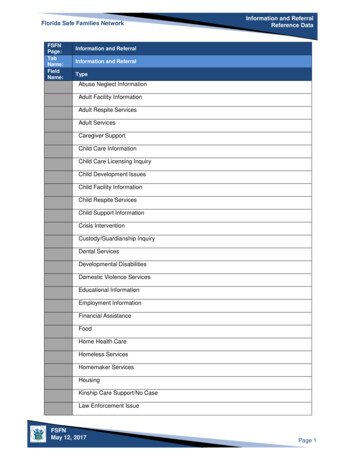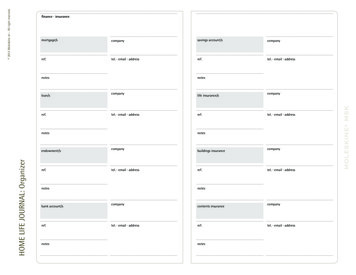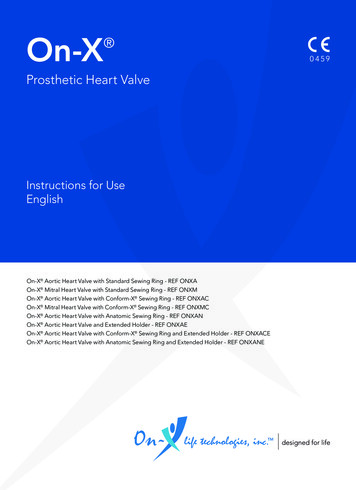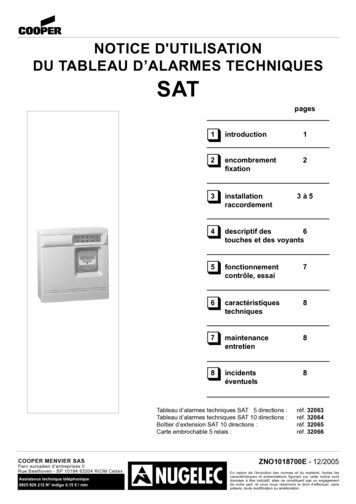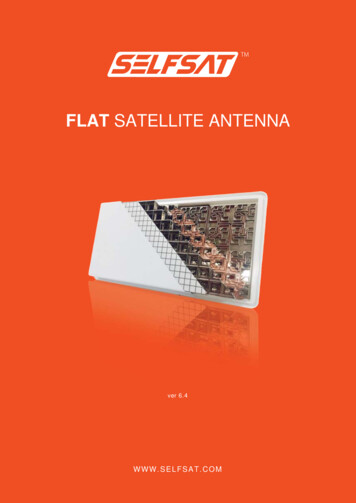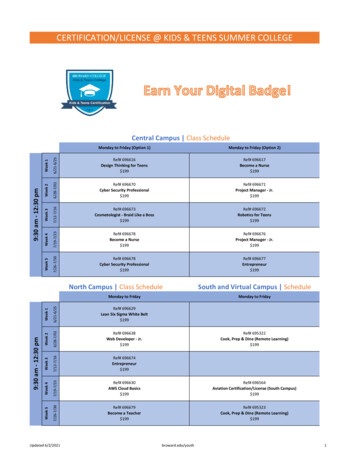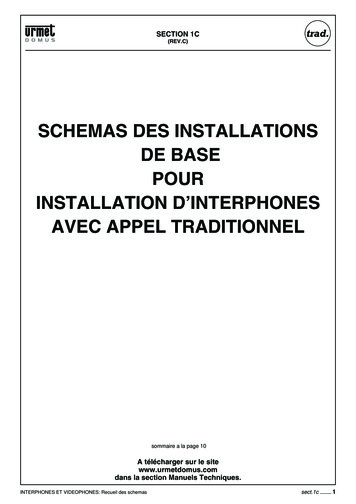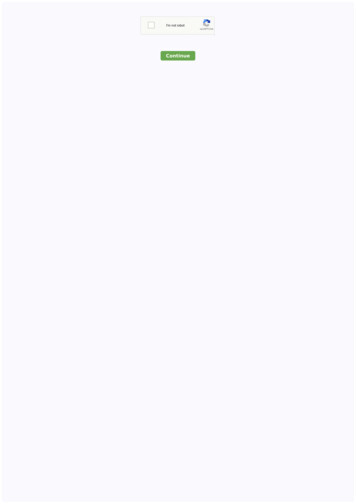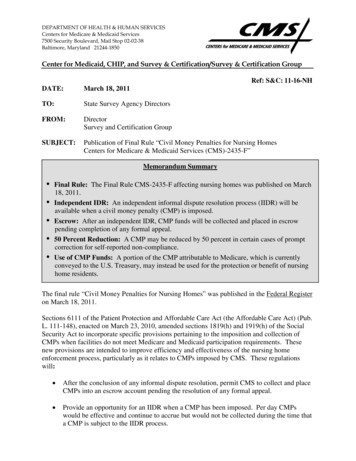
Transcription
DEPARTMENT OF HEALTH & HUMAN SERVICESCenters for Medicare & Medicaid Services7500 Security Boulevard, Mail Stop 02-02-38Baltimore, Maryland 21244-1850Center for Medicaid, CHIP, and Survey & Certification/Survey & Certification GroupRef: S&C: 11-16-NHDATE:March 18, 2011TO:State Survey Agency DirectorsFROM:DirectorSurvey and Certification GroupSUBJECT:Publication of Final Rule “Civil Money Penalties for Nursing HomesCenters for Medicare & Medicaid Services (CMS)-2435-F”Memorandum Summary Final Rule: The Final Rule CMS-2435-F affecting nursing homes was published on March18, 2011.Independent IDR: An independent informal dispute resolution process (IIDR) will beavailable when a civil money penalty (CMP) is imposed.Escrow: After an independent IDR, CMP funds will be collected and placed in escrowpending completion of any formal appeal.50 Percent Reduction: A CMP may be reduced by 50 percent in certain cases of promptcorrection for self-reported non-compliance.Use of CMP Funds: A portion of the CMP attributable to Medicare, which is currentlyconveyed to the U.S. Treasury, may instead be used for the protection or benefit of nursinghome residents.The final rule “Civil Money Penalties for Nursing Homes” was published in the Federal Registeron March 18, 2011.Sections 6111 of the Patient Protection and Affordable Care Act (the Affordable Care Act) (Pub.L. 111-148), enacted on March 23, 2010, amended sections 1819(h) and 1919(h) of the SocialSecurity Act to incorporate specific provisions pertaining to the imposition and collection ofCMPs when facilities do not meet Medicare and Medicaid participation requirements. Thesenew provisions are intended to improve efficiency and effectiveness of the nursing homeenforcement process, particularly as it relates to CMPs imposed by CMS. These regulationswill: After the conclusion of any informal dispute resolution, permit CMS to collect and placeCMPs into an escrow account pending the resolution of any formal appeal. Provide an opportunity for an IIDR when a CMP has been imposed. Per day CMPswould be effective and continue to accrue but would not be collected during the time thata CMP is subject to the IIDR process.
Page 2 – State Survey Agency Directors Provide for the collection of the CMP upon the earlier of: 1) completion of an IIDR, or 2)90 days after notice of the imposition of the CMP. Establish that when a facility is successful in a formal appeal, the applicable portion ofany CMP amount being held in escrow will be returned to the facility with interest. Establish new authority for CMS to reduce a CMP it imposes by 50 percent when CMSdetermines that a facility has self-reported and promptly corrected its noncompliance, andwaived its right to a hearing. Noncompliance constituting immediate jeopardy, a patternof harm, widespread harm, or resulting in a resident’s death will not be eligible for thisCMP reduction. In addition, the reduction will not apply if the civil money penalty wasimposed for a repeated deficiency. A facility receiving this 50% reduction may not alsoreceive the 35% reduction for waiving its right to a hearing under current regulations. Provide a facility with the opportunity to participate in an IIDR if a CMP is imposedagainst the facility. The IIDR must be requested by the facility within 10 days of receiptof CMS’s offer and must be completed within 60 days of the facility’s request so long asthe IIDR is requested timely by the facility. Provide that 90 percent of the escrowed CMP attributable to Medicare, which is currentlyconveyed to the U.S. Treasury, may instead be used for the protection or benefit ofnursing home residents with the remaining 10 percent being conveyed to the U.S.Treasury. Establish new acceptable uses of CMPs collected by CMS. Additionally, thespecified use of such funds must be approved by CMS.In order to give States sufficient time to develop and operationalize the provisions in this rule,we will be phasing in the provision implementing the availability of an independent informaldispute resolution process. In addition, we understand that States and CMS will need time todevelop protocols and training not only for the new independent informal dispute resolutionprocess but for all the provisions in this final rule. Therefore, the effective date for this rule isJanuary 1, 2012. Additional guidance regarding the use of CMP funds and the new IIDR processwill be provided through survey and certification memoranda that we will issue in the nearfuture.If you have any questions regarding this memorandum, please contact Lorelei Chapman atLorelei.Chapman@cms.hhs.gov.Effective Date: January 1, 2012.Training: This information should be shared with all survey & certification staff, surveyors andthe affected provider community.Thomas E. HamiltonAttachment: CMS 2435-Fcc: Survey and Certification Regional Office Management
Vol. 76Friday,No. 53March 18, 2011Part IIIDepartment of Health and Human ServicesCenters for Medicare and Medicaid Servicessrobinson on DSKHWCL6B1PROD with RULES242 CFR Part 488Medicare and Medicaid Programs; Civil Money Penalties for NursingHomes; Final RuleVerDate Mar 15 201017:56 Mar 17, 2011Jkt 223001PO 00000Frm 00001Fmt 4717Sfmt 4717E:\FR\FM\18MRR2.SGM18MRR2
15106Federal Register / Vol. 76, No. 53 / Friday, March 18, 2011 / Rules and RegulationsDEPARTMENT OF HEALTH ANDHUMAN SERVICESCenters for Medicare and MedicaidServices42 CFR Part 488[CMS–2435–F]Medicare and Medicaid Programs; CivilMoney Penalties for Nursing HomesCenters for Medicare &Medicaid Services (CMS), HHS.ACTION: Final rule.AGENCY:This final rule will revise andexpand current Medicare and Medicaidregulations regarding the impositionand collection of civil money penaltiesby CMS when nursing homes are not incompliance with Federal participationrequirements in accordance with section6111 of the Affordable Care Act of 2010.DATES: These regulations are effectiveon January 1, 2012.FOR FURTHER INFORMATION CONTACT: LoriChapman, (410) 786–9254.SUPPLEMENTARY INFORMATION:srobinson on DSKHWCL6B1PROD with RULES2SUMMARY:I. BackgroundTo participate in the Medicareprogram or the Medicaid program, orboth, long-term care facilities must becertified as meeting Federalparticipation requirements. Section1864(a) of the Social Security Act (theAct) authorizes the Secretary to enterinto agreements with State surveyagencies to determine whether facilitiesmeet the Federal participationrequirements for Medicare. Section1902(a)(33)(B) of the Act provides forState survey agencies to perform thesame survey tasks for facilitiesparticipating or seeking to participate inthe Medicaid program. The results ofMedicare and Medicaid related surveysare used by CMS and the State Medicaidagency, respectively, as the basis for adecision to enter into or deny a provideragreement, recertify facilityparticipation in one or both programs,or terminate the facility from theprogram. They are also used todetermine whether one or moreenforcement remedies should beimposed where noncompliance withFederal requirements is identified.To assess compliance with Federalparticipation requirements, surveyorsconduct onsite inspections (surveys) offacilities. In the survey process,surveyors directly observe the actualprovision of care and services toresidents and the effect or possibleeffects of that care to assess whether thecare provided meets the assessed needsof individual residents.VerDate Mar 15 201017:56 Mar 17, 2011Jkt 223001Among the statutory enforcementremedies available to the Secretary andthe States to address facilitynoncompliance are civil moneypenalties. Authorized by sections1819(h) and 1919(h) of the Act, civilmoney penalties may be imposed foreach day or each instance of facilitynoncompliance, as well as for pastinstances of noncompliance even if afacility is in compliance at the time ofthe current survey. The regulations thatgovern the imposition of civil moneypenalties, as well as other enforcementremedies authorized by the statute, werepublished in the Federal Register onNovember 10, 1994 (59 FR 56116), andon March 18, 1999 (64 FR 13354). Theserules are set forth at Part 488, SubpartF, and the provisions directly affectingcivil money penalties are set forth at§ 488.430 through § 488.444. In theproposed rule, published on July 12,2010, preceding this final regulation, wediscussed in more detail civil moneypenalties for facility’s noncompliance, afacility’s option to dispute citeddeficiencies and the facility’s right towaive a hearing within specifiedtimeframes and procedures (75 FR39641).As specified in section 1128A(f) of theAct, which is incorporated in sections1819(h) and 1919(h) of the Act, andconsistent with the way other civilmoney penalties are recovered, moniescollected by CMS are returned to theState in proportion commensurate withthe relative proportion of Medicare andMedicaid beds at the facility in use byresidents of the respective programs onthe date the civil money penalty beginsto accrue, and remaining funds aredeposited as miscellaneous receipts ofthe United States Department of theTreasury. Section 1919(h)(2)(A)(ii) ofthe Act specifies that civil moneypenalties collected by the State must beapplied to the protection of the healthor property of residents of any nursingfacility that the State or CMS findsdeficient, including payment for thecost of relocating residents to otherfacilities, maintenance of operation of afacility pending correction ofdeficiencies or closure, andreimbursement of residents for personalfunds lost.II. Summary of the Proposed Provisionsand Responses to Comments on theProposed RuleA. OverviewIn the July 12, 2010 Federal Register(75 FR 39641), we published a proposedrule to revise and expand currentMedicare and Medicaid regulationsregarding the imposition and collectionPO 00000Frm 00002Fmt 4701Sfmt 4700of civil money penalties by CMS whennursing homes are not in compliancewith Federal participation requirements.In response to the proposed rule, wereceived approximately 213 publiccomments. We received comments fromvarious States, health care associations,nursing homes, individuals, provideradvocacy organizations and consumeradvocacy organizations. The commentsfor this proposal ranged from generalsupport of or general opposition to theproposal to more specific commentsregarding the proposed rule.In this final rule we provide asummary of each proposed provision, asummary of the public commentsreceived, our responses to them, andany changes we are implementing inthis final rule as a result of commentsreceived.Section 6111 of the Patient Protectionand Affordable Care Act (the AffordableCare Act) (Pub. L. 111–148), enacted onMarch 23, 2010, amended sections1819(h) and 1919(h) of the SocialSecurity Act (the Act) to incorporatespecific provisions pertaining to theimposition and collection of civilmoney penalties when facilities do notmeet Medicare and Medicaidparticipation requirements.We believe that through these newstatutory provisions, Congress hasexpressed its intent to improveefficiency and effectiveness of thenursing home enforcement process,particularly as it relates to civil moneypenalties imposed by CMS.These provisions in section 6111 ofthe Affordable Care Act seek to reducethe delay which results between theidentification of problems withnoncompliance and the effect of certainpenalties that are intended to motivatea nursing home to maintain continuouscompliance with basic expectationsregarding the provision of quality care.They also seek to eliminate a facility’sability to significantly defer the directfinancial effect of an applicable civilmonetary penalty until after an oftenlong litigation process.To implement these new statutoryprovisions, we proposed to revise Part488 by adding new § 488.431 and§ 488.433. We also proposed revisions toexisting regulations throughout Part 488to further incorporate the new statutoryprovisions. The proposed changeswould be consistent with section 6111of the Affordable Care Act. We notedthat the proposed rule would providefor the establishment of an escrowaccount where civil money penaltiesmay be placed until any applicableadministrative appeal processes havebeen completed; allow for civil moneypenalty reductions when facilities self-E:\FR\FM\18MRR2.SGM18MRR2
Federal Register / Vol. 76, No. 53 / Friday, March 18, 2011 / Rules and Regulationsreport and promptly correct theirnoncompliance; in cases where civilmoney penalties are imposed, offer anindependent informal disputeresolution process where the interests ofboth facilities and residents arerepresented and balanced; and, improvethe extent to which civil moneypenalties collected from Medicarefacilities can benefit nursing homeresidents. Through the proposedrevisions, we intended to directlypromote and improve the health, safety,and overall well-being of residents.srobinson on DSKHWCL6B1PROD with RULES2B. Analysis of and Response to PublicComments1. Establishment of an Escrow Accountfor Civil Money PenaltiesUnder the existing process, facilitiesare able to avoid paying a civil moneypenalty for years because it can oftentake a long time for administrativeappeals to be completed. Concernsabout the delays in payment of a civilmoney penalty have been raised inindependent reports issued by both theUnited States GovernmentAccountability Office (GAO) and theOffice of the Inspector General of theDepartment of Health and HumanServices (OIG).Sections 6111(a) and (b) of theAffordable Care Act expand sections1819(h)(2)(B)(ii) and 1919(h)(3)(C)(ii) ofthe Act by adding a new subsection(IV)(bb) which states that, in the case ofcivil money penalties imposed for eachday of noncompliance, the penalty willnot be collected until after theindependent informal disputeresolution process under new section(IV)(aa) is completed, by which thefacility may informally challenge thenoncompliance on which the penaltywas based. (The added provisionsregarding the new independent informaldispute resolution process are discussedlater in section II.B.3. of this preamble.)In the proposed rule, we interpretedthe language of this new section (IV)(bb)to mean that any per day civil moneypenalty would be effective and continueto accrue but would not be collectedduring the time that the determinationof noncompliance which led to theimposition of a civil money penalty issubject to the independent informaldispute resolution process. This isconsistent with other provisions ofsection 6111 of the Affordable Care Actand when viewed in the context of thepurpose of the enforcement process ofthe Social Security Act. First, newsubsection (IV)(cc) of sections1819(h)(2)(B)(ii) and 1919(h)(3)(C)(ii), asamended by section 6111 of theAffordable Care Act, permits theVerDate Mar 15 201017:56 Mar 17, 2011Jkt 223001collection of the civil money penaltyupon completion of an independentinformal dispute resolution process. Ifthe per day civil money penalty did notapply and accrue during the period ofan independent informal disputeresolution process, there would not beany civil money penalty funds to collectupon completion of the process in thosecases where the independent informaldispute resolution does not result in anychange to the findings. In those caseswhere this independent informaldispute resolution process does result ina change to the findings that wouldlower the civil money penalty amounts,then the accrual would be immaterialbecause the civil money penaltieswould be appropriately adjusted (i.e.were reduced or rescinded) back to theeffective date of the civil moneypenalty. Second, it has been CMS’slongstanding position that sections1819(h) and 1919(h) of the Act providethat a per day civil money penalty canbegin to accrue as early as the date thata facility was first determined to be outof compliance and continues to accrue,without interruption, until a facility hasachieved substantial compliance or isterminated from the program.Additionally, the Act provides that theeffective date of a civil money penaltycan be retroactive to the date of anadverse event that was documentedthrough the survey process to haveoccurred prior to the issuance of aformal written notice informing thefacility that a per day civil moneypenalty has been applied. Section 6111of the Affordable Care Act does notchange the existing nursing homeenforcement process; rather it adds anadditional process to be available tofacilities as a result of the Secretary’snew authority to collect a civil moneypenalty before exhaustion ofadministrative remedies. Third, since afacility may continue to be out ofsubstantial compliance for a period oftime until it is terminated from theprogram, an interruption in the civilmoney penalty accrual would becontrary to the intended effect ofcreating financial incentives forfacilities to maintain compliance andpromptly correct any noncompliance.Since we believe Congress intended tospeed and strengthen the motivationaland deterrent effects of civil moneypenalties, we believe that suspendingthe accrual of a civil money penaltywhile the underlying noncompliancewas being informally challenged wouldundermine such motivational effects.We therefore proposed that CMS willnot collect applicable civil moneypenalty funds until either anPO 00000Frm 00003Fmt 4701Sfmt 470015107independent informal disputeresolution process is completed or 90days has passed since the notice of civilmoney penalty imposition has beenissued, whichever is earlier. The 90 dayperiod is the maximum combined timeperiod permitted from the date of thenotice of civil money penaltyimposition (when a facility has theopportunity to request an independentinformal dispute resolution) to the datefor completion of the independentinformal dispute resolution processitself. This combined maximum timeperiod is consistent with the provisionsof new sections 1819(h)(2)(B)(ii)(IV)(cc)and 1919(h)(3)(C)(ii)(IV)(cc) of the Act,as amended by section 6111 of theAffordable Care Act (which is discussedin more detail below).i. Collection and Placement in EscrowAccountSections 6111(a) and (b) of theAffordable Care Act add new sections1819(h)(2)(B)(ii)(IV)(cc) and1919(h)(3)(C)(ii)(IV)(cc) of the Actwhich provide the authority for CMS tocollect and place civil money penaltiesinto escrow accounts pending theresolution of an appeal. This may bedone on the earlier of (1) the date whena requested independent informaldispute resolution process is completed,or (2) 90 days after imposition of thecivil money penalty. We have proposedimplementing these requirements at§ 488.431(b)(1)(i) and § 488.431(b)(1)(ii).While the amended statutory languagecontemplates that a facility will beeither wholly successful or unsuccessfulin challenging its determination ofnoncompliance during the independentinformal dispute resolution process, theproposed regulation reflects anunderstanding that there are times whena facility is partly successful. In suchinstances, the facility may be able toargue successfully for change to onlysome of its cited noncompliance.If such change as a result of theindependent informal disputeresolution were to affect the civil moneypenalty amounts owed, (for example,through deletion of a germanedeficiency), then the amount initiallyimposed would need to be adjustedaccordingly before being collected andplaced in the escrow account.ii. When a Facility Is Successful in aFormal Administrative AppealSections 6111(a) and (b) of theAffordable Care Act amend sections1819(h)(2)(B)(ii) and 1919(h)(3)(C)(ii) ofthe Act by adding new section (IV)(dd)which provides that collected civilmoney penalties may be kept in anescrow account pending the resolutionE:\FR\FM\18MRR2.SGM18MRR2
srobinson on DSKHWCL6B1PROD with RULES215108Federal Register / Vol. 76, No. 53 / Friday, March 18, 2011 / Rules and Regulationsof any subsequent appeals. Sections6111(a) and (b) of the Affordable CareAct also adds new section (IV)(ee) torevise sections 1819(h)(2)(B)(ii) and1919(h)(3)(C)(ii) of the Act, to requirethat when a final administrativedecision results in the successful appealof a facility’s cited determination ofnoncompliance that led to theimposition of the civil money penalty,that civil money penalty amount beingheld in escrow will then be returned tothe facility, with interest. We haveproposed at § 488.431(d)(2) that if theadministrative law judge (ALJ) reversesthe civil money penalty amount inwhole or in part, the escrowed amountcontinues to be held pending expirationof the time for CMS to appeal the ALJdecision or, where CMS does appeal, aDepartmental Appeals Board decisionaffirming the ALJ’s reversal of the civilmoney penalty. We believe these newstatutory provisions contemplate notonly a situation where the facility iseither wholly successful or unsuccessfulin its administrative appeal of adetermination which led to a civilmoney penalty imposition, but that theyalso include situations in which afacility is partially successful in itsappeal. Thus, the proposed regulationrecognizes this possibility and providesthat CMS will return collected civilmoney penalty amounts commensuratewith the final administrative appealresults. We do not plan to includespecifics in this regulation about howthese requirements would beoperationalized because we believe thatsuch guidance is more appropriatelysuited for inclusion in our StateOperations Manual after dialogue withinterested stakeholders. However, we doexpect that the collection of a per daycivil money penalty under this final rulemay be a two-step process. In proposed§ 488.431(b)(2), we expect that ininstances when a facility has notachieved substantial compliance at thetime a per day civil money penalty canbe collected and placed in an escrowaccount, that collection would consist ofthe penalty amount that has accruedfrom the effective date of the penaltythrough the date of collection. Anothercollection would need to occur later inthe process for any final balancedetermined to be due and payable oncethe facility achieves substantialcompliance or is terminated from theprogram.The comments we received and ourresponses are set forth below.Comment: A few commenters wantedto know who will be responsible for thecollected amounts and how will it beprocessed and tracked.VerDate Mar 15 201017:56 Mar 17, 2011Jkt 223001Response: CMS will be responsiblethrough its accounting component tooversee the collection process and themaintenance of the escrow account,while a CMS data component willmaintain the system that will record andtrack any possible administrativeappeals associated with the collectedcivil money penalty.Comment: Several commentersexpressed concern that the earlycollections and escrowing of civilmoney penalty amounts has thepotential for disrupting the cash flowthat nursing homes need to successfullyoperate especially in smaller facilities.Other commenters felt CMS may imposesignificant civil money penalties on aSNF that may not have the availableresources to put the total civil moneypenalty amount into escrow and to paythe costs associated with a formalappeal. If the resources are unavailableand there are no alternatives to postingthe full amount of the civil moneypenalties, the commenters argued thatCMS will have effectively deniedparticipating SNFs any meaningfulopportunity to contest survey findings.Such a result would operate to depriveSNFs of their due process rights underthe 5th Amendment to the U.SConstitution based upon theirrecognized property and liberty interest.CMS should therefore permit SNFs toenter into payment plans, to post bondsor to use other alternative approaches tosecure payment and allow SNFs tofreely access these options.Response: We understand that theremay be rare cases where a particularprovider could have limited funds dueto the financial viability of their entity.In fact, our existing regulations at§ 488.438 provide that a facility’sfinancial condition is one factor that isconsidered in determining the amountof the civil money penalty to beimposed. However, the commenterraises the prospect that the problem forthe facility may not be so much theeventual sum total amount of civilmonetary payments due, but rather themore immediate timetable for theplacement of funds in escrow.Therefore, in response to the commentsreceived, we have revised § 488.431(b)by adding a new subsection (3) thatstates ‘‘CMS may provide for an escrowpayment schedule that differs from thecollection times of paragraph (1) of thissubsection in any case in which CMSdetermines that more time is necessaryfor deposit of the total civil moneypenalty into an escrow account, not toexceed 12 months if CMS finds thatimmediate payment would createsubstantial and undue financialhardship on the facility.’’PO 00000Frm 00004Fmt 4701Sfmt 4700In addition, at § 488.431(b)(4), westate that ‘‘If the full civil money penaltyis not placed in an escrow accountwithin 30 calendar days from the datethe provider receives notice ofcollection, or within 30 calendar days ofany due date established pursuant to ahardship finding under paragraph (b)(3),CMS may deduct the amount of the civilmoney penalty from any sum then orlater owed by CMS or the State to thefacility in accordance with§ 488.442(c).’’While we appreciate the practicalfinancial challenges for some nursinghomes in rare circumstances, we do notagree that under this rule facilitieswould be denied any due process. Thenew independent informal disputeresolution process is an option availablefor facilities to contest survey findingsprior to the collection of civil moneypenalties to be placed in escrow andshould reduce the chances of erroneousdeprivation. This is followed by postcollection full formal hearing before theDepartmental Appeals Board that hasalways been available for contesting thefindings that led to the imposition of acivil money penalty. We believe thatthese two processes address any dueprocess concerns. Furthermore, webelieve that there are additionalsafeguards and protections available tofacilities to challenge the accuracy ofsurvey findings at various points duringthe survey, including interviews duringthe survey and the exit conference.Comment: One commenterrecommended changing ‘‘may’’ to ‘‘shall’’in proposed § 488.431(b)(1) so that thecivil money penalty is always placed inescrow when a facility requestsindependent informal disputeresolution. Conversely, we receivedseveral comments indicating that thestatutory language appeared to bediscretionary and allowed the Secretaryto require that not all civil moneypenalties be placed in escrow.Response: Section 6111 of theAffordable Care Act amends sections1819(h) and 1919(h) of the Act thatprovide the Secretary with the broaddiscretion to collect and place civilmoney penalties into an escrow accountpending resolution of any subsequentappeal. The opportunity to participatein an independent informal disputeresolution is triggered when a civilmoney penalty imposed against thefacility is subject to being collected andplaced in an escrow account prior to theresolution of an appeal. In order tophase in the new collection and escrowprovisions, CMS intends to initiallyfocus only on civil money penaltiesimposed as a result of the most seriousdeficiencies. These would be the civilE:\FR\FM\18MRR2.SGM18MRR2
srobinson on DSKHWCL6B1PROD with RULES2Federal Register / Vol. 76, No. 53 / Friday, March 18, 2011 / Rules and Regulationsmoney penalties that would be subjectto being placed into escrow and,subsequently, an independent informaldispute resolution process. Thus, we arerevising proposed § 488.431(a) to clarifythat the opportunity for independentinformal dispute resolution will beoffered within 30 days of the notice ofthe imposition of a civil money penaltythat will be collected and placed intoescrow. We are also revising§ 488.431(b) and § 488.442 to clarify thatthe collection process and due date forless serious civil money penalties willbe the same for civil money penaltiesimposed by the state; in other words,CMS will use the process that is used bythe states for collecting those penaltiesthat are not placed into escrow untilCMS completely phases in the newcollection process. CMS will issuefurther guidance at a later date regardingthe collection and escrow provision aswell as the companion independentinformal dispute resolution process.Comment: One commenter wantedclarification on CMS’s proposedestablishment of an escrow account forcivil money penalties. One commenterpointed out that in the case of per daypenalty, subsection (a)(1)(B)(IV)(bb) ofsection 6111 is explicit that ‘‘a penaltymay not be imposed for any day duringthe period beginning on the initial dayof imposition of the penalty and endingon the day on which the informaldispute process under item (aa) iscompleted.’’ The NPRM states that CMSinterprets this to mean that ‘‘any per daycivil money penalty would be effectiveand continue to accrue but not becollected.’’ A commenter asked if thismeans the civil money penalty is notformally imposed in the first notice tothe facility. Another commenter arguedthat CMS ignores the quoted language,interpreting the legislation to mean thata per day penalty cannot be collectedduring the period between imposition ofthe penalty and the conclusion of thedispute resolution process, but it cancontinue to accrue and be collectedthereafter. The commenter argued thatnone of the reasons CMS offers for itsinterpretation are compelling orsupported in law, and that the goal ofthe survey and certification process is toverify or secure substantial compliancewith federal requirements, not generaterevenue. Secondly, the commenterstated that long standing positions mustyield to changes in the law, that CMShas no authority to render this minimalincentive smaller still, and that ifanything, the interruption in penaltyaccrual is incentive for CMS to providefor speedy independent reviewprocesses.VerDate Mar 15 201017:56 Mar 17, 2011Jkt 223001Response: The notice of theopportunity for the independentinformal dispute resolution p
Provide a facility with the opportunity to participate in an IIDR if a CMP is imposed against the facility. The IIDR must be requested by the facility within 10 days of receipt of CMS's offer and must be completed within 60 days of the facility's request so long as the IIDR is requested timely by the facility.
